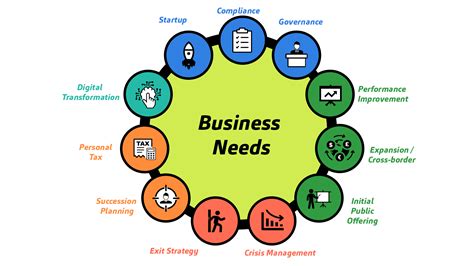Researching Prospective Big Companies
When it comes to contacting big companies for business, the first step you need to take is researching prospective companies that you want to work with. Researching big companies that align with your business goals will help you save time and energy when contacting them. Depending on the industry or sector you are in, the research process may look different, but there are general steps you can follow to ensure you are well-prepared when reaching out to big companies.
1. Identify your target market
The first step in researching prospective big companies is identifying your target market. Your target market should be a specific demographic or group of people that you want to sell your product or service to. Once you’ve identified your target market, you can narrow down the companies that align with their interests, needs, and demographics. This will help you to tailor your approach and messaging to the specific company you are targeting.
For example, if you are a small business that sells organic skincare products, your target market may be health-conscious individuals between the ages of 25-45 who live in urban areas. With this information, you can identify big companies in the beauty, retail, and health industries that target similar demographics.
2. Research industry and company trends
After identifying your target market, the next step is to research industry and company trends. You can use online resources to stay up to date on the latest news and trends in your industry. This will help you understand the challenges and opportunities big companies are facing, and tailor your approach accordingly.
For example, if you are a software company that sells cybersecurity solutions, staying up to date on the latest cyber threats will not only help you to better understand your customers’ needs but also help you to approach big companies with relevant solutions.
3. Analyze company culture and values
Understanding a company’s culture and values is essential when researching big companies to do business with. Analyzing a company’s culture and values will help you identify companies that align with your own business values and mission.
This is crucial because doing business with a company that has different values than yours may lead to conflicts in the future, which could damage your business relationship. You can analyze a company’s culture and values through their website, corporate social responsibility reports, and their social media platforms.
4. Study the competition
Another important aspect of researching big companies is studying the competition. By studying your competition, you can identify gaps in the market and tailor your approach and messaging accordingly. Identifying and addressing gaps in the market will help you differentiate your company from the competition.
You can study your competition through online resources, conferences, trade shows, and other relevant industry events.
5. Use social media
Social media is a valuable resource for researching big companies. You can follow big companies on various social media platforms to stay up to date on their latest news, products, and services. You can also use social media to engage with big companies by commenting on their posts, direct messaging, and tagging them in relevant content.
By using social media, you can establish a relationship with big companies before reaching out to them for business. This will help to establish trust and credibility, which can increase the chances of a successful business partnership.
In conclusion, researching prospective big companies before contacting them is essential when reaching out for business. By identifying your target market, researching industry and company trends, analyzing company culture and values, studying the competition, and using social media, you can better prepare yourself to approach big companies with confidence and increase the chances of a successful business partnership.
Identifying the Right Person to Contact
When it comes to contacting big companies for business, it is essential to identify the right person to contact. You do not want to waste your time reaching out to someone who can’t make decisions or won’t be interested in your proposal. Therefore, research is necessary to find the appropriate contact person.
The first step in identifying the right person is to check the company’s website for any information about the team or staff. Most big companies have an “About Us” section that includes information about their executives and management team. Find out who is in charge of the particular department or area that your business proposal pertains to and make a note of their name and position.
If you are unable to find the right person on the website, try searching for news articles or press releases related to the company. These documents may contain information about any recent personnel changes, promotions, or new hires. LinkedIn is another valuable resource for finding the appropriate contact. Search for the company’s name and filter your search by job title and location. This should provide you with a list of employees who work for the company, and you can narrow down the results by department.
Another option is to reach out to the company’s customer service representatives or support team. Explain the nature of your business proposal and ask if they can refer you to the appropriate individual. Though they may not give you a direct email or phone number, they can provide you with the necessary information to contact the right person through the company’s official channels.
Additionally, industry events and conferences are excellent places to network and connect with the appropriate individuals. Big companies often participate in such events to expand their network and make new business connections. Participating in the same events gives you a chance to network, introduce yourself, and potentially schedule meetings with the right contact.
Remember to be respectful and professional while conducting your research and reaching out to potential contacts. Ensure that you have a valid reason for reaching out to them and personalize your message to demonstrate that you have done your research and are genuinely interested in doing business with their company.
Overall, identifying the right person to contact is essential for making any progress in establishing a business relationship with a big company. Researching the company’s website, industry events, using LinkedIn, or asking customer service representatives are effective ways to find the right person. Be professional and respectful when making contact and make a good impression to pave the way for a fruitful business relationship.
Crafting a Compelling Pitch for Your Business

When reaching out to big companies for business, the pitch you craft can make all the difference. It’s your first impression, so you want to make sure it’s compelling and leaves a lasting impression. Here are some tips to help you craft a pitch that will capture the attention of big companies:
1. Identify the Company’s Needs

Before you start crafting your pitch, you need to research the company and identify their needs. What products or services do they offer? How can your business complement what they already have? These questions will help you tailor your pitch to the specific needs of the company.
2. Keep Your Pitch Concise

No one wants to sit through a lengthy pitch. Keep your pitch concise and to the point. Start with an attention-grabbing introduction, then move on to describing your business and how it can benefit the company you’re reaching out to. Be sure to highlight your unique selling points.
3. Show How You Can Add Value

The most important part of your pitch is showing how your business can add value to the company. You need to be able to demonstrate how your product or service can solve their problems or meet their needs. This could be through cost savings, increased efficiency, or improved customer satisfaction. Make sure you have specific examples to back up your claims.
Example Pitch:
“Hi [Company Name], I came across your website and noticed that you offer a wide range of innovative products. After researching your company, I believe my business could complement what you already have. At [Your Company Name], we specialize in [Your Service/Product], which I think would add immense value to your business. Our unique selling point is [Unique Selling Point]. We have already worked with [Name a Similar Company] and helped them [Achieve a specific result]. We would love the opportunity to discuss how we can help your company reach its goals.”
Crafting a compelling pitch takes time and effort, but it can pay off immensely in the end. Keep these tips in mind when reaching out to big companies for business, and you’ll be well on your way to success.
Utilizing Social Media and Professional Networks for Connections

Utilizing social media and professional networks can be one of the best ways to connect with big companies for business. Social media platforms such as LinkedIn, Twitter, Facebook, and Instagram have made it easier to reach out to decision-makers in different industries. Below are some tips and tricks to help you make meaningful connections:
1. Research and Follow Company Pages

The first thing you need to do is research the big companies you’re interested in working with and identify the social media platforms they are active on. Follow their pages and keep an eye on their updates, events, and any job openings. This will also help you stay up-to-date with the latest company news and industry insights.
2. Engage and Interact with Company Posts

Once you have followed the pages of big companies, the next thing to do is to engage with their posts. You can leave comments, like or share their posts, and even tag other relevant people in the comments section. This will help you build a relationship with the company and its employees, increasing your chances of getting noticed.
3. Join Relevant Groups and Communities

Joining relevant groups and communities on social media can provide an opportunity to network with individuals who share similar interests and goals. Look for groups that include decision-makers in the industry and participate in discussions, ask questions, and share your thoughts. This could lead to more meaningful conversations and potentially, new business connections.
4. Attend Virtual Events and Webinars

The COVID-19 pandemic has led to an increase in the number of virtual events and webinars organized by different companies and organizations. Attending these events can provide a great opportunity to learn from industry experts, stay up-to-date with industry trends, and network with potential business partners. Make sure to interact with other attendees and the speakers to build lasting connections.
Conclusion
Utilizing social media and professional networks can help you connect with big companies for business. By researching and following company pages, engaging with their posts, joining relevant groups and communities, and attending virtual events and webinars, you can build meaningful connections that can lead to new business opportunities.
Strategically Following Up and Persisting Despite Obstacles
Once you have made contact with a big company, the next important step is to follow up with them. This may involve sending reminder emails or calls, building relationships, or offering additional information to strengthen the connection. In this section, we will discuss the strategies you can use to follow up on your business with big companies.
1. Set a clear schedule
The first step is to set a clear schedule for your company to follow up on a regular basis. Set realistic goals and ensure that you do not miss any important deadlines. Remember, it takes time to build relationships; therefore, the schedule you set should allow enough time for each contact. In many cases, it takes several attempts to gain the attention of a big company.
2. Offer Value in Communication
When it comes to following up on a big company for business, it is essential that you offer something of value in your communication.
For example, you can provide a helpful article or an expert opinion on a topic that you know interests them. Having researched the company and having a firm understanding of their needs, can be essential to generate conversations and building a meaningful relationship.
3. Be prepared to adapt your approach
If your initial strategy isn’t working, be prepared to change it. Perhaps a different member of your team can represent the company better or maybe your attention to detail in your communication needs to improve? Remember, if at first, you don’t succeed, don’t give up. Perhaps all you need to do is change your approach.
4. Keep the communication open and flowing
When you have started following up with a big company, it’s essential to keep communication open and flowing. This also involves being responsive and reactive to their communication too. Ensure that messages are not overlooked, micromanage the flow of communication, and respond appropriately to their message.
5. Be persistent despite obstacles
Following up with a big company should be viewed as a long term strategy. You are unlikely to achieve success overnight. Obstacles may arise, and it is essential to be persistent despite these setbacks. Sometimes, a company loses interest or may not consider your products or services at first, but with persistence, opportunities can present themselves in the future. Remember, no sales pitch is wholly lost – just not yet fully fulfilled.
In conclusion, following up on big companies is an essential step in establishing a business relationship. The key is to set your goals clearly, offer value in communication, be adaptable, keep communication open and flowing, and be persistent despite obstacles. With these strategies, you will be well on your way to opening doors, developing rapport, and building long-lasting relationships with big companies.


